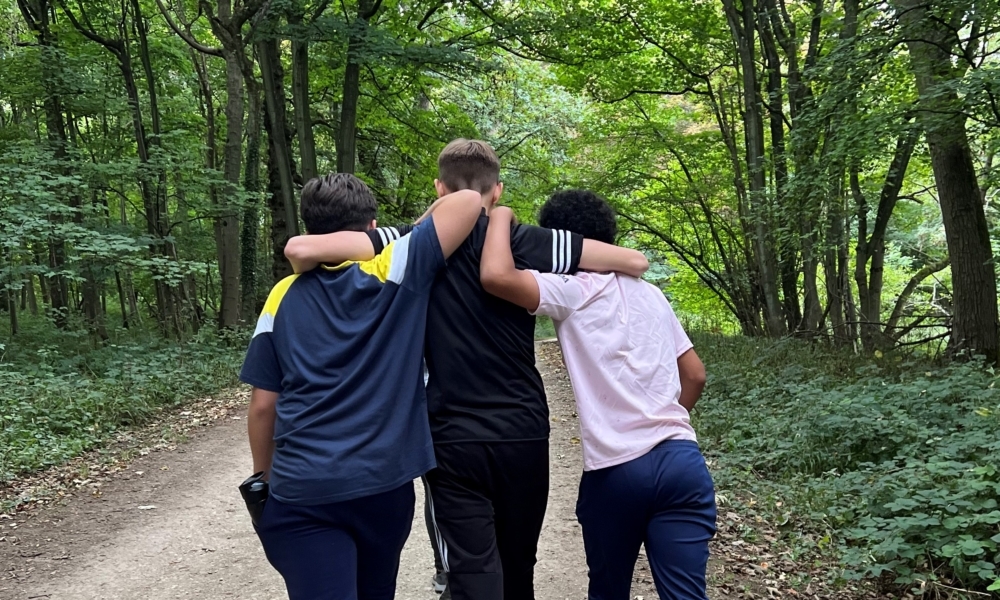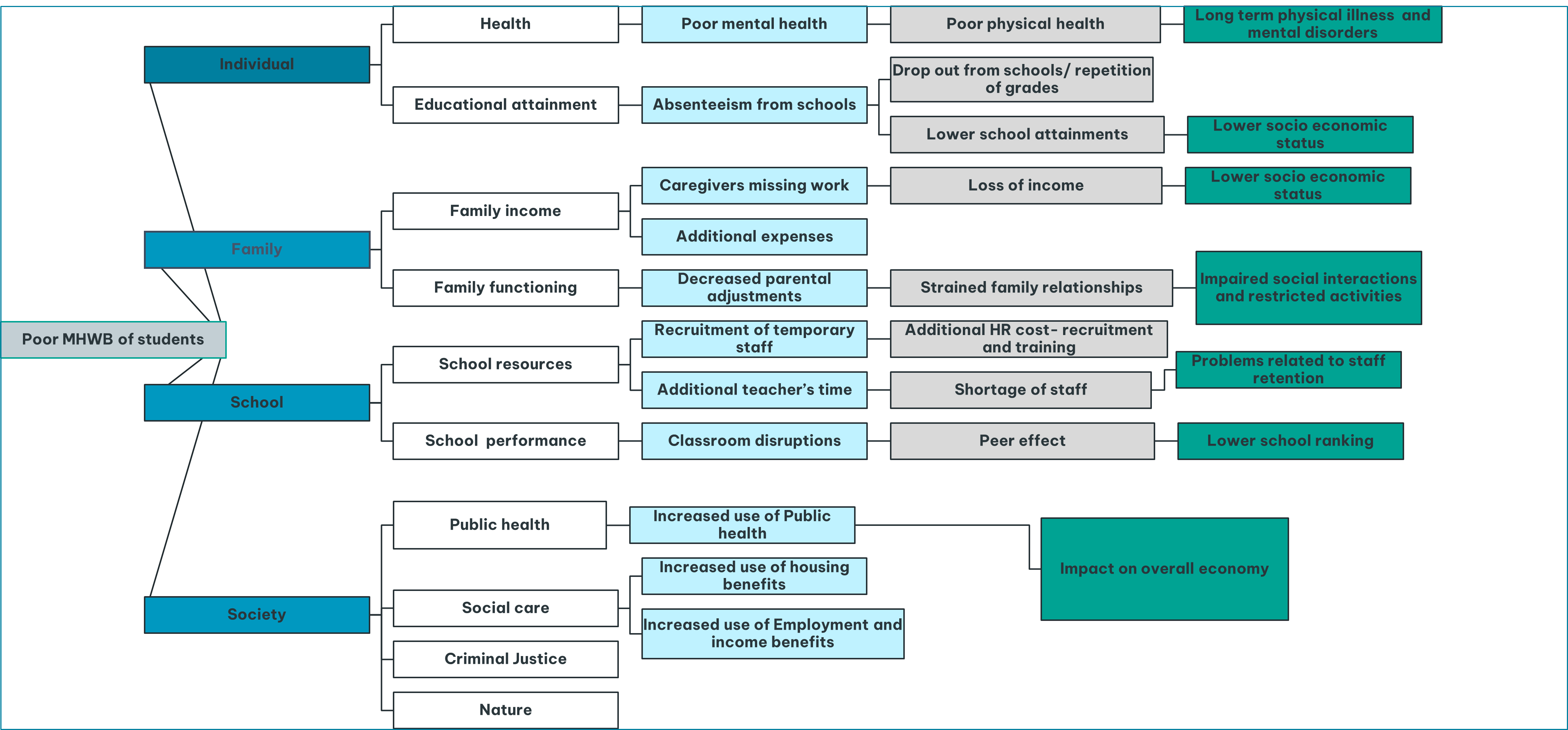Is Nature a Policy Solution to Mental Health in Schools? Reflections on Our Recent Teach-In
Associated Sprints
Recent News
- From beans to minerals: the new projects getting science into policy
- Hunger on our doorstep
- Place-based working to meet national well-being and sustainability goals

On June 18th, The Education and Mental Health Sprint co-led a Teach-In with the Department for Education (DfE), bringing together experts in education, mental health, and environmental policy to discuss a pressing question: Can nature-based programmes in schools support the mental health and wellbeing of young people?
As co-leads of this research sprint, Ilina Singh and Katrin Wilhelm, we are excited to share insights from this event and explain why this work matters now more than ever.
The session was invaluable to disseminating our research and to gaining initial feedback. In this post we reflect on the structure, format and motivation to run events directly within policy partner teams, and on what we gained from the event.
About the project
The Education and Mental Health Sprint brings together researchers, educators, and policymakers to explore whether nature (through school gardens, outdoor learning, or other nature-based activities) can be a scalable, evidence-based solution to the growing mental health crisis among young people. The sprint aims to bridge the gap between scientific research and practical policy, fostering school environments that support adolescents’ flourishing.
Building on previous work
Our recent Teach-In drew on multiple streams of research within the Agile Sprint, including insights from our Deliberative Policy Action (DPA) Workshop in early February, interviews with teachers, input from our Young People’s Advisory Group (NeurOx YPAG), and the development of an economic evaluation model.
The session with DfE aimed to deepen understanding of the practical implications of our research, providing an opportunity to connect threads from earlier discussions and further explore how our findings translate into real-world contexts.
Read our Sprint page to learn more about our work investigating ‘Is nature a policy solution to mental health in schools?’ You can read our first output, a Nature-based Education Glossary, to understand more what terms we’re using here.
What Happened at the Teach-In?
The Teach-In was designed to share our latest findings with policy partners and gather their feedback. We presented:
- Early evidence showing how nature-based programmes can positively influence student mental health and wellbeing.
- Practical challenges and opportunities in integrating these approaches into existing school structures.
- Economic and policy considerations for scaling up nature-based programmes nationally.
Key Themes from the Discussion
During the Teach-In, Professor Ilina Singh and Associate Professor Apostolos Tsiachristas responded to a wide range of questions.
Complementary Interventions
Participants explored whether implementing arts-based and nature-based interventions involved trade-offs, with many suggesting the two approaches could in fact complement each other in supporting student wellbeing. As Professor Singh noted, “nature is just one resource that schools already have at their disposal,” and proposed that multiple approaches could be integrated to enhance mental health and wellbeing in schools.
School Connectedness
There was strong interest in whether activities like gardening or outdoor learning could foster a greater sense of belonging and connection among students. Sprint researcher Jessica Lorimer shared insights from the team’s ongoing scoping review (protocol available), highlighting examples where garden spaces and gardening activities created meaningful opportunities for students to collaborate, get to know one another, and build a stronger sense of connection.
Role of Teachers
A recurring theme was the central importance of teacher confidence and capability. Teachers are not just facilitators but key drivers of success for nature-based programmes. Policymakers and the research team were clear in showing that supporting teacher wellbeing may be just as important as supporting students.
Economic Value
At the end of the session, Sprint health economics team (Associate Professor Apostolos Tsiachristas and Dr. Saba Arshad) introduced an exciting new framework for evaluating the long-term value of these interventions, highlighting the need to look beyond short-term costs to consider broader, lasting benefits for students, schools, and communities.

Why This Work Matters Now
A mental health crisis is growing among UK young people, especially after the Covid-19 pandemic. The 2023 Mental Health of Children and Young People in England survey found that 20% of UK children and young people aged 8-25 are likely to face mental health challenges.
Schools are a primary resource for mental health support for young people. Policy aimed at nature-based programmes for mental health and wellbeing supported by robust evidence will contribute towards national efforts to prevent mental health challenges from getting worse and reduce NHS mental health waiting lists. In addition, this project may also inform evidence-based strategies for the UK government’s strategy of ‘green prescribing’.
Next Steps – Moving Forward
While these early findings are promising, the Oxford team emphasized that this is still very much a work in progress. The current evidence is preliminary, and more rigorous research is needed to understand how and why these programmes are effective, who they benefit most, and in what contexts. It’s a fascinating and hopeful area of study, but there’s still much more to uncover.
The Teach-In surfaced some great questions that the Oxford team is now actively pursuing. For example, the Oxford team is preparing a preliminary bid to ‘complete the circle’ by understanding the two-way relationship between wellbeing and environmental health, a promising area that could deepen insights into how nature-based interventions impact both individuals and communities.
Importantly, the team hopes ongoing research will help address a critical issue: how to avoid undermining the benefits of nature by focusing solely on human-centred outcomes. Finding this balance will be central to advancing the work and we look forward to continuing our partnership with the Department for Education to achieve these goals.
Get Involved
Last week’s Teach-in sparked rich discussion about the real-world implications of the Agile team’s work, and how it might intersect with ongoing government priorities. This teach-in was another great step in co-creating solutions with policy partners, researchers, and —most importantly— young people. We’re excited to see where the conversation goes next.
Want to know more about this project or get involved?
Contact Jessica Lorimer for more information: jessica.lorimer@psych.ox.ac.uk
Visit: https://www.agile-initiative.ox.ac.uk/sprints/is-nature-a-policy-solution-to-mental-health-in-schools/
This Teach-In was led by CO-PIs Professor Ilina Singh and Dr. Katrin Wilhelm (Department of Psychiatry, University of Oxford), and included a talk by Associate Professor Apostolos Tsiachristas (Department of Primary Care, University of Oxford). We’re grateful to Dr. Alex Hastie at the Department for Education for helping to facilitate this event.


